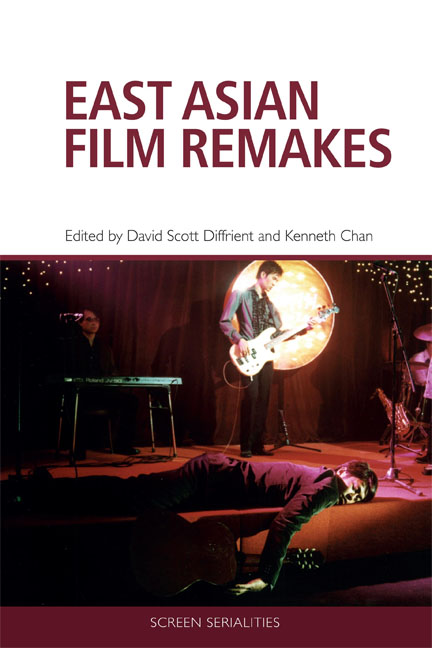Book contents
- Frontmatter
- Contents
- List of Illustrations
- Foreword
- Notes on Contributors
- Introduction: East Asian Film Remakes
- Part I Re-fleshing the Text: Sex, Seduction, Desire
- Part II Serialising Ozu: The Enduring Legacy of a Cinematic ‘Tofu Maker’
- Part III Revisiting Personal/Political Traumas in East Asian Action Films, Gangster Films and Westerns
- Part IV Local Flavours and Transcultural Flows in East Asian Comedies, Dramas and Fantasies
- Index
Foreword
Published online by Cambridge University Press: 01 March 2025
- Frontmatter
- Contents
- List of Illustrations
- Foreword
- Notes on Contributors
- Introduction: East Asian Film Remakes
- Part I Re-fleshing the Text: Sex, Seduction, Desire
- Part II Serialising Ozu: The Enduring Legacy of a Cinematic ‘Tofu Maker’
- Part III Revisiting Personal/Political Traumas in East Asian Action Films, Gangster Films and Westerns
- Part IV Local Flavours and Transcultural Flows in East Asian Comedies, Dramas and Fantasies
- Index
Summary
With the birth of film came film remaking. In the age of mechanical (and digital) reproduction, filmmaking and remaking have been inherently intertwined. The long-running disparagement of remakes as merely pale imitations of the ‘originals’ is, therefore, best understood as symptomatic of the essentialist obsession with the ‘first’, which itself is nothing but a construct. The establishment of the field of film remakes studies over the past three decades has fundamentally challenged this original-copy hierarchy, underlining not only the socio-cultural-political contextualisation of film cultures and film remaking alike, but also the built-in intertextuality of the motion picture medium. Given the rhizomic nature of film industries and cultures across the world, remakes stand as the prime site for refuting Euro-American-centered film studies, while reckoning with the long-lasting ramifications of colonialism and coloniality, overlaid with global capitalism.
East Asian Film Remakes arrives on the scene to tackle precisely these over-arching issues. Divided into four sections, the essays in this volume, magisterially edited by David Scott Diffrient and Kenneth Chan, collectively unfurl a kaleidoscopic landscape of expansive filmic and mediatic connections, some of which have been obscured and understudied; and their resurfacing through the contributors’ rigorous research decisively reinforces the film medium's fundamental intertextuality and intermediality. Relatedly, the volume puts much-needed pressure on the very parameters of the object of study, namely, remakes. Highlighting the elasticity of the definition of remakes, the contributors demonstrate film remaking as part and parcel of filmmaking itself.
The volume's unique contribution, however, lies in its focus on East Asia (Mainland China, Hong Kong, Japan, Korea and Taiwan), a terrain rife with layered and convoluted contentions and connections both within and vis-à-vis other parts of the world. By foregrounding East Asian location-specific film remakes, this volume offers a fresh take on a multifaceted interactive filmic world that must be understood in terms of its own evolving ecology, rather than simply in reference to Euro-American cinema. It is energising to see East Asian, European, Australian and American scholars from diverse disciplines including Film and Media Studies, East Asian Studies and Cultural Studies collaborating on this critical project that charts out East Asian film remaking across history, space, politics, genres and aesthetics, inviting us to confront the pressing questions of what constitutes remaking in a medium that is predicated upon (digital) reproduction with differences; what do we gain by studying remakes in a world where connections go hand in hand with contentions, and, as co-editor Diffrient puts it, ‘familiarity’ and ‘newness’ become two sides of the same coin?
- Type
- Chapter
- Information
- East Asian Film Remakes , pp. xi - xiiPublisher: Edinburgh University PressPrint publication year: 2023

